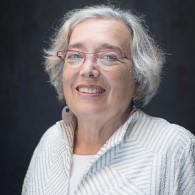
“Mourning Loss and Starting Over: Hungarian Jews in 1945”
Professional Background
Dr. Alice Freifeld is Associate Professor of History, affiliate faculty in the Center for Jewish Studies, and former Director of the Center for European Studies at the University of Florida in Gainesville. She teaches Habsburg history and the 20th century history of Central and Eastern Europe, including topics on genocide, mass migration, and displacement. Dr. Freifeld received her bachelor’s degree, master’s degree, and doctorate in history from the University of California, Berkeley.
Dr. Freifeld is the author of numerous publications, including Nationalism and the Crowd in Liberal Hungary, 1848-1914 (published jointly by the Woodrow Wilson Center and Johns Hopkins University Press), which received the Barbara Jelavich Book Prize by the Association for Slavic, Eurasian and East European Studies. She also coedited East Europe Reads Nietzsche with Peter Bergmann and Bernice Rosenthal (1998). Her article, “Identity on the Move,” resulted from her previous Mandel Center fellowship, and was published in the Randolph Braham series on the Holocaust in Hungary.
Fellowship Research
Dr. Freifeld was awarded a 2019–2020 Judith B. and Burton P. Resnick Invitational Scholar for the Study of Antisemitism Fellowship for her project “Mourning Loss and Starting Over: Hungarian Jews in 1945.” Dr. Freifeld’s current research project began during an earlier residency (2001–2002) at the Mandel Center as a 2001–2002 “Life Reborn” Foundation for Displaced Persons fellow at the Mandel Center. In her research, Dr. Freifeld seeks to show how Hungarian Jewry, the largest surviving Jewish population in Central Europe and the second largest in the displaced persons camps, confronted options both for reassimilation and emigration. Using the records of the International Tracing Service digital archive, this project follows movements of deportees across Europe, their circuitous travels home, and the infiltration of many across the borders to the West.
